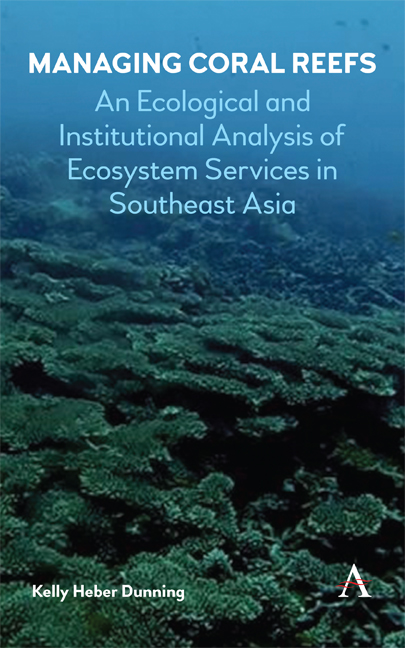 Managing Coral Reefs
Managing Coral Reefs Book contents
- Frontmatter
- Contents
- List of Figures
- List of Tables
- Acknowledgments
- List of Abbreviations
- 1 Introduction
- 2 Theory, Practice and Policy Context of Coral Reef Management
- 3 Governing Natural Resources in Indonesia and Malaysia
- 4 Case Study Sites and the Coral Triangle
- 5 Integrated Management of Marine Protected Areas
- 6 Legitimate Marine Protected Areas
- 7 Adaptive Capacity of Marine Protected Areas
- 8 Policy Recommendations for Marine Protected Area Management in Developing Countries
- Appendix A Research Design
- Appendix B Data and Methods
- Appendix C Coral Cover Results
- References
- Index
8 - Policy Recommendations for Marine Protected Area Management in Developing Countries
Published online by Cambridge University Press: 16 August 2018
- Frontmatter
- Contents
- List of Figures
- List of Tables
- Acknowledgments
- List of Abbreviations
- 1 Introduction
- 2 Theory, Practice and Policy Context of Coral Reef Management
- 3 Governing Natural Resources in Indonesia and Malaysia
- 4 Case Study Sites and the Coral Triangle
- 5 Integrated Management of Marine Protected Areas
- 6 Legitimate Marine Protected Areas
- 7 Adaptive Capacity of Marine Protected Areas
- 8 Policy Recommendations for Marine Protected Area Management in Developing Countries
- Appendix A Research Design
- Appendix B Data and Methods
- Appendix C Coral Cover Results
- References
- Index
Summary
Overview
In this concluding chapter, I summarize the lessons learned about integrated management, legitimacy and adaptive capacity from the marine protected areas (MPAs) described in this book. Then, I offer policy recommendations for Indonesian and Malaysian decision makers with responsibility for managing coastal biodiversity conservation. I conclude with recommendations for tropical coastal biodiversity conservation in general, arguing strongly on behalf of co-managed institutions for natural resource management and highlighting what I argue are the strongest explanatory factors for the success of Balinese MPAs: stakeholder engagement that spans economic sectors, gender, religious beliefs, socioeconomic class and education levels.
Insights on Integrated Management of MPAs
Integrated management of MPAs occurs when economics, conservation and social systems are given consideration before any management decisions are made. MPA managers are more likely to see success when they consult stakeholders about decisions that might impact reef tourism businesses, such as closing parts of a reef impacted by a storm or bleaching damage, or levying fees or regulations on those who depend on reef access for a living. I found that integrated management (when local business and MPA managers work together) is present in co-managed Indonesian MPAs and absent inMalaysian Marine Parks.
In Indonesia, this is advantageous to stakeholders such as the dive industry or boatmen who bring tourists to snorkel because their voices are heard before restrictive rules are enacted, often eliminating the need for them to break the rules. Integrated management acts as a “steam release” where potentially harmful activities are not eliminated outright, but instead limited or restricted. For instance, isolated instances of line and pole fishing where fisherman take only what they can carry were incorporated into the rules for several Balinese MPAs reviewed in this study. In Malaysia by contrast, the lack of integrated management, and the lack of stakeholder engagement overall, resulted in the loss of employment in fishing for nearly every resident in every village within MPAs in the 1980s. This created an atmosphere in which rule breaking was tolerated, ignored or even seen as a survival tactic among village residents and some Marine Parks officers.
- Type
- Chapter
- Information
- Managing Coral ReefsAn Ecological and Institutional Analysis of Ecosystem Services in Southeast Asia, pp. 145 - 160Publisher: Anthem PressPrint publication year: 2018


